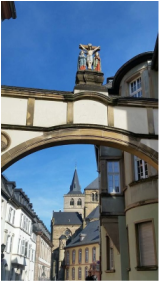 Paul continues to commend the Thessalonians for the way they received the message (with the joy given by the Holy Spirit), they have lived the life of followers of Jesus, and become models for all throughout the region. In fact, others in the area reported to Paul and Silas about how the Thessalonians "turned to God from idols to serve the living and true God" (1 Thess 1:9). Their faith helped them to believe; their love led them to serve; their hope enabled them to wait for Jesus' return in glory (v. 10). For Reflection: Are there idols in my life? What must I do to get rid of them? Am I serving others while I await Jesus' return? Let us pray. Jesus, I don't know when you are coming back, but I want to be ready whenever my final day comes. Please smooth away my bumpy, knobby exterior, like these squash, so I can enter blemish-free into your heavenly kingdom.
0 Comments
 "Our gospel came to you not simply with words, but also with power, with the Holy Spirit and with deep conviction" (1 Thessalonians 1:5). Upon hearing the good news that Jesus was the Messiah, that he died to set them free from their sins and to bring salvation to them, many people came to believe in Jesus. These words of the gospel message delivered by Paul and Silas were accompanied by powerful works of the Holy Spirit to heal and deliver people. People's lives were changed. They were set free from the power of sin and eternal death to live in the freedom that Jesus brought. They received the good news with such conviction that they were able to suffer persecution without faltering, even as new believers. Paul thanked God for the way in which they had received the good news. He said, "And we also thank God continually because, when you received the word of God, which you heard from us, you accepted it not as the word of men, but as it actually is, the word of God, which is at work in you who believe" (1 Thessalonians 2:13). They had set their lives on a new path. What lay around the bend was unknown but they knew that with the power of God they could face anything. The word of God was at work in them. For Reflection: What changes has the gospel, the word of God, brought in my life? Let us pray. I thank you, Father, that someone preached your word to me and I too came to believe in your word and the power of your death and resurrection. I thank you for all who have preached your word to me and I thank you for opening my heart to receive it.  Paul always began his letters with greetings and thanksgivings. His first letter to the people in Thessalonica is no exception. The purpose of the letter is to answer the questions of this young church but he begins with praise and encouragement. Paul assures them that he is constantly praying for them for he knows that they live in a city that is an international trading center with many non-Christian influences in their daily lives. Paul also knows that they have been under persecution because he himself had to flee not that long before he sent this letter back to them. And what does Paul recall about them? Their work produced by faith, their labor prompted by love, and their endurance inspired by hope in Jesus (1 Thess 1:3; see also 1 Corinthians 13:3). Faith, hope and love are the three theological virtues, supernatural virtues, given by God to help us live the Christian life, growing in love with God and others. Paul is commending them for already growing in these virtues even as a young church. For Reflection: Who needs to hear some praise and encouragement today? Could I be commended for my work produced by faith, my labor prompted by love and endurance inspired by hope in Jesus? Let us pray. Father, I thank you for my family and friends who encourage me. I thank you particularly for those who encourage me in faith, prompt me to love and inspire me to hope.  So let us look at an early church group in Thessalonica. We know something about them because Paul wrote to them after he established a church there around the year 51 A.D. It is a port town; therefore it's a town of influence where people came and went from various parts of the Mediterranean world. There were Jews in Thessalonica and Paul, as was his custom, first preached about Jesus in the synagogue. Three weeks in a row on the Sabbath, Paul, as well-educated visiting rabbi, explained the Scriptures to them, proving to them that Jesus was the Messiah who had to suffer, die and rise from the dead. Some Jews were convinced along with a number of Greeks (and even some women!). Although they established an early church there, all did not go well for Paul and Silas in Thessalonica. The Jews who were not convinced that Jesus was the Messiah started a riot in an effort to get Paul and Silas arrested. Paul and Silas escaped and went to Berea, but Jason their host did not. He was arrested and had to post bond. The Thessalonian Jews chased Paul and Silas all the way to Berea and stirred up trouble there, so Paul moved on to Athens. Persecution kept Paul on the move but also served to spread the good news about Jesus around the Mediterranean. For Reflection: For Paul, preaching, persecution and pursuit were the normal Christian life. How does my normal Christian life look in comparison? Let us pray.  When Jesus sent out the apostles and disciples to follow his example (Luke 9 and 10 as we discussed in our last post), he gave them the power and authority to do what he did. Luke 9:1 says, "he gave them power and authority." In Luke 10:1, it says, "the Lord appointed seventy-two others." Those who were with Jesus were appointed with the power and authority of Jesus. In Luke's gospel, we don't have the same ending as in Matthew 28. Instead Jesus opened their minds to understand what was written about him in the Law of Moses, the Prophets and the Psalms (Luke 24:44-45) and he told them to wait for the Holy Spirit to clothe them with power. Since he would no longer be present with them in the flesh, they needed the power of the Holy Spirit to be with them. They receive that empowerment of the Holy Spirit in Acts 2. Peter, the presumably uneducated fisherman, begins to preach from the Prophet Joel and from Psalms. And so the next chapter, the chapter of the church, the believers, our chapter begins. Believers receive this power from on high, the Holy Spirit, in baptism. Sacramental churches also have Chrismation or Confirmation. Some add the "baptism of the Holy Spirit". Whatever we want to call it, we need the empowering of the Holy Spirit, the third person of the Trinity, to enable us to live the normal Christian life. For Reflection: Have I been baptized? Am I clothed with power from on high? If not, today is the day. If I have been baptized, do I act like it? Let us pray. Jesus, I have been baptized in the name of the Father, the Son and Holy Spirit. Help me to live up to it today and every day with the power of the Holy Spirit.  Let us skip to Luke 9 and 10. This thread started on September 25 and I want to get to the point before we get lost in the details. In Luke 4:16-21 Jesus laid out his mission for his time on earth. In the next several chapters, as we have seen, Jesus goes about fulfilling his mission. He teaches, he heals the sick, he sets the oppressed free, he brings good news to the poor. We could continue through chapters 7 and 8 to demonstrate the day-to-day life that Jesus lived with his small group of apostles and his larger group of disciples. Jesus set the example of the Christian life day in and day out. Now to Luke 9:1-6. Here Jesus sends out the 12 apostles to go and do the very things he has been doing. They are to go out and follow his example. And so they did. They "went from village to village, preaching the gospel and healing people everywhere" (Luke 9:6). In Luke 10:1-16, he sends out 72 disciples with the same basic instructions as he gave to the 12. Later the 72 return joyous and amazed that even the demons obey them (Luke 10:17). We could carry this theme from Luke into Acts of the Apostles showing that, after faltering at the crucifixion, the disciples pick themselves up, with the tremendous help of the Holy Spirit, and continue the mission. They spread the good news of the coming of the kingdom of God, preaching to all, healing the sick and bringing them into discipleship. In other words, this is what the normal Christian life is about - telling people about Jesus, the kingdom of God, healing the sick, setting the captives free and making disciples. Not all are sent to go far and wide away from home and family, but all are sent to spread the word in their everyday encounters, in their normal sphere of influence. For Reflection: Have I been living the normal Christian life? When was the last time I spoke with anyone about Jesus? When did I last interact with either the poor in life or the poor in spirit? Let us pray. Well, Jesus, some days my Christian life doesn't look so normal. So I commit myself anew to being your disciple and acting like one. Help me to see opportunities to talk about you and the kingdom with my family and others, people I know and people I don't know, and to act on those opportunities. I want to be your disciple and live the normal Christian life.  In Luke 6:17-26 we have the blessings and woes. Much has been said about the blessings, also known as the beatitudes, but let's look at the last one of those and the last one of the woes. "Blessed are you when men hate you, when they exclude you and insult you and reject your name as evil, because of the Son of Man. Rejoice in that day and leap for joy, because great is your reward in heaven. For that is how their fathers treated the prophets" (Luke 6:22-23), and "Woe to you when all men speak well of you, for that is how their fathers treated the false prophets" (Luke 6:26). Jesus is not speaking of the accolades that come with hard work and success in life which can be richly deserved. A person isn't awarded a Nobel prize without great accomplishment. Whoever wins a medal at the Olympics has worked long and hard and given up all other pursuits. That type of acclaim is not the subject of the blessings and woes in Luke 6. No, Jesus is saying, "Woe to you who are yes men to kings and presidents, who lead people away from God rather than toward God." He is saying, "Blessed are you who truly speak the word of God." If we speak the word of God, we may well put ourselves in danger and suffer for it. For an example, we need only look back to our discussion of Elijah speaking God's word to King Ahab. Elijah had to go into hiding and be fed by ravens while the false prophets of Baal were feted at the King's court. Elijah spent years living with the widow while Ahab actively hunted him in order to kill him. But God kept Elijah safe. Elijah didn't feel blessed at the time, nor did he rejoice, but I'm sure his reward in heaven was great. For Reflection: Have I ever had to stand up for what was right? If so, how did I do? Let us pray. Jesus, I admit it's not easy to stand up publicly for your word and for what is right in your eyes. Still, I trust that when I do you will be with me and will give me the words to say. Help me to rejoice in insult and rejection on your behalf.  We are looking at how Jesus began to fulfill the prophecy of Isaiah which he read in the temple in Nazareth (Luke 4:16-21). He has been preaching the good news to the poor (financially poor and spiritually poor), he has been healing people and working other miracles. Now it is time for him to choose a team who can help him with doing this work of God. Alone Jesus cannot cover enough ground, even in one country, to make a big difference and spread the word as far as he wants it to go. He needs help (Luke 6:12-16). His next step is to spend the night in prayer. That's a long time to pray about one thing. I don't know about you, but I don't very often spend the night in prayer. But as you read through the Gospels, you see that Jesus spent a lot of time in prayer, often late at night or early in the morning when he could get away from the crowds. After the night of prayer, Jesus didn't choose just any 12 men. He chose from among those who had been with him consistently, who knew his basic message, and who had seen his miracles. Even with the choice of Judas, who ultimately betrayed him, I believe he selected the men his Father wanted him to name. This short passage can teach us a couple of things: the importance of prayer before important decisions, or developing a team rather than trying to go about God's work alone. But it also causes me to think about those who were not chosen. What happened to them? Were they fine with Jesus' selection or were they jealous and disgruntled? What did Jesus say to them to smooth things over? For Reflection: Have I been passed over, not chosen for a team before? Was I the last one chosen for a team in school? Was I turned down for a date? Was I passed over for a job? Let us forgive the person(s) who did not choose us and pray a blessing for them. Let us pray. Jesus, there have been times when I was not chosen, when I was overlooked. I choose now to forgive that person(s) for not choosing me. And I ask you to heal the memory of the rejection in me and pour out a special blessing on that person today.  It's doubtful that Jesus healed people on the Sabbath just to tweak the noses of the Jewish authorities, but he certainly did not shy away from healing on the Sabbath in their presence. The healing of the man with the shriveled hand is told amidst a series of stories where Jesus confronts the religious leaders. The account in Luke 6:6-11 specifically tells us that Jesus knew that they were watching him to see what he would do and even knew what they were thinking. So when Jesus asks them, "Which is lawful on the Sabbath: to do good or to do evil, to save life or to destroy it?" they can't deny that he has them pegged. But there is a second reason they can't answer. Jesus has framed the question differently than they would have. To them, the issue was that Jesus was practicing his profession (healing) on the Sabbath which was forbidden. But Jesus puts his healing in terms of good and evil. They could hardly reply that it was forbidden to do good on the Sabbath. For Reflection: There are often many ways to approach an issue, a question, a problem. Do I seek out the opinions of others on what approach to take? The counsel of someone wiser in the ways of God can be of tremendous benefit.  Because I've never used a wineskin, Jesus' example of the wineskins in Luke 5:37-38 has not been one that spoke to me. The biblical commentators say this story is about flexibility, remaining pliable to God. I do understand about flexibility; my joints and muscles remind me every day that I am not as young and flexible as I used to be. A similar example is in Ezekiel 36:26 in which the Lord says, "I will give you a new heart and put a new spirit in you; I will remove from you your heart of stone and give you a heart of flesh." We now know through medical science that hardened arteries and hardened heart muscle will eventually kill a person. Arteries and hearts that are hardened cannot efficiently move blood and oxygen through our bodies. On the other hand, proper food and exercise help keep our arteries and hearts in good physical shape. Repentance and listening to God help to keep our hearts in good spiritual shape. The Lord also says through Ezekial, "I will sprinkle clean water on you, and you will be clean; I will cleanse you from all your impurities and from all your idols. And I will put my Spirit in you and move you to follow my decrees and be careful to keep my laws" (Ezekial 36:25, 27). So the way to a new heart and a new spirit is repentance, forgiveness by God and receiving the Spirit. For Reflection: Jesus was saying to the religious leaders that their hearts were hardened; they were not flexible or adaptable to God's ways. What kind of shape is my heart in? Read Hebrews chapter 3 for further reflection. Let us pray. "O God, you are my God, earnestly I seek you; my soul thirsts for you, my body longs for you, in a dry and weary land where there is no water. On my bed I remember you; I think of you through the watches of the night" (Psalm 63:1, 6). |
AliceI started this website and blog on May 1, 2012. I am a Catholic who has been in ministry for many years. I first developed what I would call a close relationship with Jesus in the early 1970s. Ever since then I have been praying with people for healing and other needs. It is because I have seen so many of these prayers answered that I am so bold as to offer to pray for you individually through this website and phone line. Archives
July 2021
Categories
All
|
Proudly powered by Weebly

 RSS Feed
RSS Feed